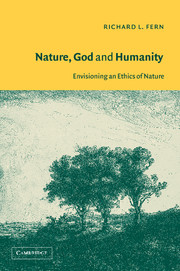Summary
This book originated in environmental ethics courses taught at Yale University during the years 1989 to 2000. As such, it owes a large debt to the students, undergraduate and graduate, mostly divinity and forestry, who listened and engaged, agreeing here, disagreeing there, forcing me to re-think and clarify one issue after the other. I trust that what follows repays some of that debt and, especially, makes clear why I asked them to read more than the standard texts, to wade through histories of ecology, philosophical arguments about the moral standing of animals and plants, theologies of creation, socio-political assessments of the environmental movement, so forth and so on. They were a hardy lot and I owe them much.
One thing I learned from them is that deep tensions exist in the way people think about nature. One tension appears in relation to modern science: a respect for and virtually automatic deference to what science tells us about nature is often combined with a no less genuine conviction that there is more to nature than a merely quantitative science can tell us. As to what this “more” might involve, lively affirmations of ecological spirituality appear arm-in-arm with a zealous distrust of religion. In both cases, science and religion, established ways of thinking, are affirmed with reservations, reservations tied to ethical concerns.
- Type
- Chapter
- Information
- Nature, God and HumanityEnvisioning an Ethics of Nature, pp. xi - xviPublisher: Cambridge University PressPrint publication year: 2002

